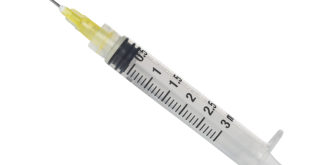Is your child going to have ear tubes soon? Read about what type of anesthesia to expect here.
We have a new little girl at home and hopefully she will not have to undergo surgery any time soon. But little kids can get recurrent ear infections. And sometimes a surgeon may recommend ear tube placement.
Many anesthesiologists take care of children everyday who are having ear tubes placed. These procedures are performed under general anesthesia.
This means your child will be asleep and unaware of any pain or discomfort during the procedure. The anesthesiologist will be present for the entire duration of the ear tube placement to make sure your child is safe and comfortable.
But the anesthesia usually given to kids for “ear tube placement” can be a little different.
In the majority of cases, the anesthesiologist will have your child breathe anesthesia gases through a small plastic mask in order to induce general anesthesia. This process will take place in the operating room with the anesthesiologist, surgeon, and nurses present. Very rarely, parents will be allowed to accompany their child into the operating room to be present as general anesthesia is started. But this is not the norm and depends on hospital policy.
After your surgeon has spoken with you, the operating room nurse and anesthesiologist will take your child to the operating room. Sometimes, the anesthesiologist will have recommended that your child drink some flavored medicine about 30 to 45 minutes prior to the procedure. This medicine can help children relax prior to being separated from their parents.
It often contains Versed (ie. Midazolam), which may make your child drowsy and less nervous about separating from you when it comes time to proceed to the OR. Once this medicine is given, make sure to keep a close eye on your child. This can make them drowsy and affect their balance and coordination. If they are laying in the hospital bed, make sure the guard rails are up to protect them from falling. If they are in your lap, make sure you have a good hold of them.
But, not all anesthesiologists use this oral pre-medication for a variety of reasons (patient medical history, preference, etc) so once again, don’t be concerned if your child does not require this medicine.
Once your child is in the operating room, he or she will be closely monitored with the standard monitors that are used on all patients for the entire procedure: blood pressure, EKG, pulse oximetry, carbon dioxide measurement, etc. They will drift off to sleep as they inhale a mixture of oxygen and anesthesia gases.
This is not painful for your child. The anesthesia gases may smell a little funny, but that’s about it. In our practice, we have masks that have a bubble gum flavor so that the anesthesia gas has a more pleasant smell for the kids as they fall asleep.
Occasionally an IV will be started when your child is asleep. Once again, this depends on a variety of factors, but will be discussed with you by the anesthesiologist. After your child is completely asleep, the surgeon will perform the procedure. Because your child is breathing anesthesia gas through the mask throughout the procedure, they will stay asleep. When the surgeon is finished, the anesthesia gas is turned off, and your child begins to wake up.
It is not uncommon for kids to be disoriented when they wake up from the anesthesia. The recovery room nurses are great at creating a comfortable environment for your child as they fully awaken from the effects of the anesthesia. And the nurses will unite you with your child as soon as it is safe to do so. Many of the nurses are parents themselves and know what it feels like to be separated from a child.
Has your child had ear tube surgery recently? How was the experience? Was your kid nervous about having surgery? Please let us and other parents know by leaving your comments in the forum. No need to register, just let us know how it went.
Thanks so much for stopping by anesthesiamyths.com!
Dr. Joe
 Anesthesia Myths: Get the Facts, Lose the Fear | Your #1 Anesthesia Resource in Simple language
Anesthesia Myths: Get the Facts, Lose the Fear | Your #1 Anesthesia Resource in Simple language




